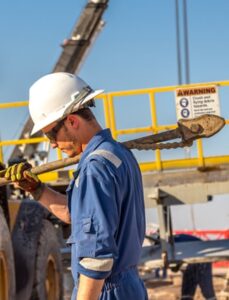Original article published by Safety+Health
 Washington — For oil and gas extraction workers, a combination of extended work hours, long commutes and insufficient sleep increases their odds of engaging in risky driving behaviors, according to a recent NIOSH study.
Washington — For oil and gas extraction workers, a combination of extended work hours, long commutes and insufficient sleep increases their odds of engaging in risky driving behaviors, according to a recent NIOSH study.
A previous study from the Centers for Disease Control in Prevention found that motor vehicle-related crashes are the leading cause of work-related deaths in the industry. To explore the underlying causes, NIOSH researchers – from October 2017 to February 2019 – surveyed 500 oil and gas extraction workers in Colorado, North Dakota and Texas.
Almost two-thirds of the respondents reported working 12 or more hours a day, while nearly half slept less than seven hours a night. The average round-trip commute time was about two hours. About a quarter of the workers reported falling asleep while operating a work vehicle or feeling “extremely drowsy” while driving at work more than once a month. Additionally, 17% said they nearly had crashed while driving at work within the past week.
Findings also show that although a majority of the workers’ employers had established vehicle safety policies covering near-miss crash reporting, fewer than half of the respondents indicated their employers’ policies included journey management (47%), fatigue management (42%) and maximum work hours (39%).
“These results underscore the need for employer policies to prevent risky driving events among workers in oil and gas extraction,” NIOSH says, adding that those policies should include “programs to limit long work hours, reduce long daily commutes, promote sufficient sleep and reduce drowsy driving.”
The study was published online in the American Journal of Industrial Medicine.
McCraren Compliance offers many opportunities in safety training to help circumvent accidents. Please take a moment to visit our calendar of classes to see what we can do to help your safety measures from training to consulting.


